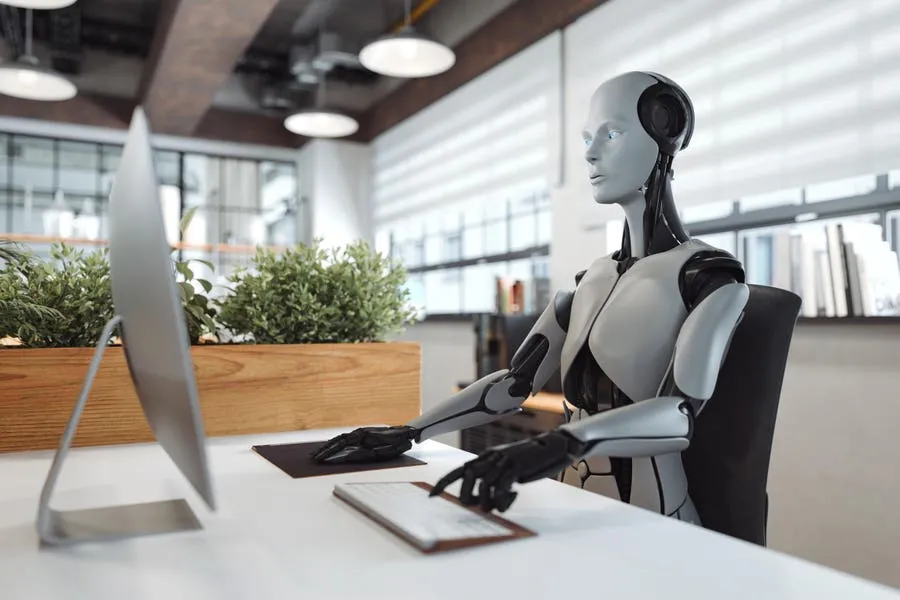Forbes contributors publish independent expert analyses and insights.
Are you training for an outdated job? If so, AI could replace it, and you might be unemployed by 2030. Headlines continue to warn of AI eliminating millions of positions, like Microsoft's recent layoff of 9,000 employees. But a quieter trend is brewing with a shift from emphasizing job loss to job creation. Experts recommend that you focus, not on what AI is replacing, but on what AI is quietly inventing: seven of the weirdest, most in-demand careers of the next decade. With AI creating 7 in-demand careers, some are already hiring for these positions.
The fast growth of AI has threatened the workforce for years. According to Gallup, 22% of U.S. workers are worried they will lose their jobs to generative AI -- a seven percent increase since 2021. And experts have reported ways to outsmart AI those threats and future-proof your career.
Much of the public debate around AI focuses on job displacement. McKinsey estimates that AI could displace up to 800 million workers by 2030. But the study also points out that AI isn't just eliminating roles. It's inventing new ones. It predicts that AI will create more jobs than it eliminates, especially in fields where technology is used to augment human capability rather than replace it.
Sam Altman, CEO of OpenAI, said in a recent interview that we are heading toward a complete redefinition of work. He predicted a surge in demand for roles focused on AI supervision, creativity and problem-solving.
Ford CEO Jim Farley also warns that AI could wipe out half of all white-collar jobs. But he adds that this will also create entirely new types of employment focused on human-machine collaboration.
"We're watching an evolution, not an extinction," says Gavin Yi, CEO of Yijin Hardware, a global leader in precision CNC manufacturing. "AI is changing what humans do, not eliminating the need for them. The future workforce will be more hybrid, combining machine intelligence with human judgment."
It's important to stay apprised of the new jobs that are opening up, instead of thinking about the old jobs that are being eliminated. Yi identifies seven new jobs that AI will invent by 2030.
- Prompt Engineer. "Prompt engineering is to AI what coding was to the early days of the internet," Yi explains. He says this role involves crafting highly specific prompts to guide AI tools like ChatGPT. Prompt engineers mix of logic, language and creativity, and fields like tech, law and education are already hiring prompt engineers.
- AI Ethics Officer. Yi points out that AI touches everything from credit scoring to criminal justice. "Ethics officers will help companies develop guidelines to ensure fairness, transparency and compliance with global regulations," he states.
- AI-Assisted Healthcare Technician. "As AI begins to assist with diagnostics, medical imaging and treatment planning, technicians who can operate these systems and work with patients will become essential," according to Yi.
- AI Maintenance Specialist. Even though factories and logistics hubs are investing in intelligent machines, Yi points out that those machines still need human oversight. He describes them as specialists who understand both mechanical systems and AI behavior will be vital. "The factory worker of tomorrow won't just hold a wrench," Yi notes. "They'll monitor dashboards and algorithms too."
- Sustainable AI Analyst. Yi says that AI consumes enormous energy, adding that it can also be used to reduce emissions and waste. He describes analysts in this role will work to ensure AI is used efficiently and contributes to sustainability goals.
- AI-Enhanced Creative Director. "From fashion to film, creative leaders who can integrate AI into their workflows will be able to experiment at scale," Yi stresses. "These directors will act as curators, combining intuition with machine-generated content."
- AI Literacy Educator. Yi reminds us that professionals will be needed to train others on how to use AI effectively and ethically, now that it's embedded in everything from office tools to customer service. He believes that this includes schools, governments and private companies.
Instead of training for disappearing jobs, experts agree that it's more prudent to look forward, making sure you develop the skills for the in-demand jobs in the next five years. If you're a student, recent graduate or one of today's workers, Yi says the worst mistake you can make is preparing for a job that won't exist in five years.
"In 2010, nobody trained to be a social media manager. By 2020, it was a core role in nearly every company," he points out. "In 2025, we're already seeing new jobs emerge. The smartest thing anyone can do is pay attention to where AI is creating opportunity, not just where it's causing fear."
Yi's comments drive home the importance of paying attention to the new trend of AI creating 7 new fields that can future-proof your career by 2030. He recommends focusing on skills that can't be easily automated. Problem-solving, adaptability, communication and a basic understanding of how AI systems work are likely to remain relevant across sectors. "AI won't kill jobs," Yi concludes. "But it will make some jobs feel obsolete." People who learn how to work with AI instead of against it will come out ahead as the trend of AI creating 7 in-demand careers will continue into the future.
